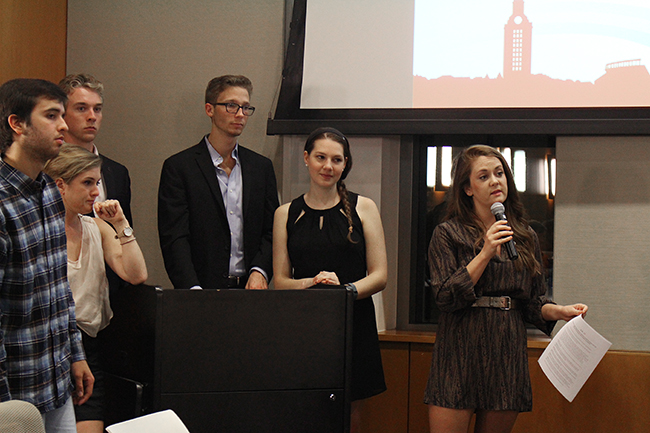Bernie Sanders’ political revolution may be seeping into college politics — the UT-Austin Student Government introduced Assembly Bill 9 Tuesday to reduce the amount of money candidates are able to spend on campaigns. The purpose of the bill is to increase the diversity in Student Government, and if passed, be a more forward-thinking piece of legislation than any current U.S. government law.
Currently, the campaign spending limits allow students $1,023 for executive alliance elections, $614 for University-wide representatives and $409 for college representatives. The new bill would dramatically reduce those limits to $511, $204 and $153 respectively. Taral Patel, biology and government senior and student government chief of staff, talked about the limitations of the current campaign finance allowances.
“Lots of students simply do not have $1,000 — or two months of rent — on hand to wager for running and trying to win an elected position in a student organization,” Patel said.
Even on a national level, campaign finance and its influence on government elections has become a contentious social issue for many Americans. And with the advent of the U.S. Supreme Court case law that allows unlimited political contributions by both corporations and individuals, various forms of corruption have arisen in the U.S. government. One of these forms of corruption manifests in the lack of diversity within Congress, where 80 percent are white, 80 percent are male and 92 percent are Christian. Comedian Dean Obeidallah wrote in The Daily Beast about the problem with the lack of diversity in American government.
“Look, I don’t care if you are liberal or a conservative,” Obeidallah said. “It’s impossible to make the claim that our Congress accurately reflects the demographics of our nation. And it’s not missing by a little but a lot. If Congress accurately reflected our nation on the basis of race, about 63 percent would be white, not 80 percent. Black [men and women] would hold about 13 percent of the seats and Latinos 17 percent."
Although the problem with diversity in UT’s student leadership is not quite as extreme as that within the federal government, it does paint a picture of what the bill is trying to prevent. And since UT has a slightly more diverse population than the nation, it has even more of an obligation to promote diversity by increasing access to student government for various minority groups. Public health senior and UT Student Government administrative director, Amber Magee, talked about the hopeful effects of the proposed bill.
“This legislation will hopefully have more students filing for election that aren’t typically seen in Student Government,” Magee said. “We are hoping to further diversify the students who feel represented by Student Government and who make use of the resources and access that Student Government has.”
The University of Texas at Austin constantly boasts its motto, “what starts here changes the world.” In Assembly Bill 9, the University has a chance to make good on that promise. The students, then, must seize the opportunity to pass legislation so inclusive and progressive that even the federal government has no parallel.
Choudhury is an economic freshman from Dallas. Follow him on Twitter @Mubarratc.





















